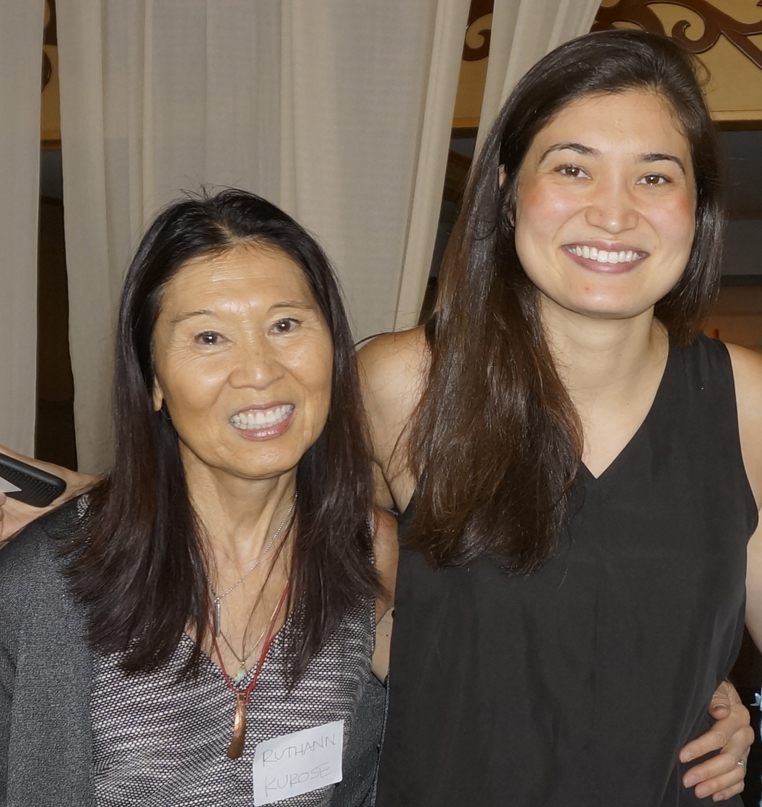
Mika Kurose Rothman and mom Ruthann (Photo by George Liu/NWAW)
Editor’s Note: This was a speech by Mika Kurose Rothman at a Sept. 14 gathering at the Wing Luke Museum to remember Ben and Ruth Woo.
My earliest memory of Auntie Ruth is as a superhero. When my brother, Mori, and I were little kids, my mom, Ruthann, would often stop by Auntie Ruth’s licensing agency. Many of you who knew Auntie Ruth and my mom may have guessed that these quick stops inevitably became longer “chit chats” — they could talk for hours.
And when she made these quick stops, she’d leave me and Mori in the car, with the windows cracked open. It didn’t take long for Auntie Ruth, our superhero, to realize that Mori and I were still in the car, and she flew from her office across the parking lot to rescue us from the backseat. Once inside, Auntie Ruth offered us sembei rice cracker snacks, which we munched on while picking up small tidbits of their conversation. At that age, we didn’t fully understand Auntie Ruth’s role in the community. But we knew that this small lively Nisei, with an infectious laugh, wielded an unknowable amount of power.
Year after year, Mori and I listened to more chit chats at the licensing agency and joined in on bento lunches at Bush Garden. And we came to fully understand the superhero that was Auntie Ruth. From 9 to 5, she was the owner of a small licensing agency. But during early mornings, coffee breaks, evenings, and weekends, the superhero emerged. She launched political careers, leveraged support for key community projects like the Wing Luke Museum and International Community Health Services (ICHS), advanced civil rights and social justice causes like redress and immigrant rights, and continuously opened doors for young people and people of color.
A few things changed as I grew older. I moved up from the backseat of the car to the driver’s seat. Our visits with Auntie Ruth moved from the licensing agency to her comfy living room, and when we hugged, Auntie Ruth’s head met my stomach instead of my shoulder. But Auntie Ruth’s status as a superhero? That never changed.
My mom, Auntie Ruth, and other community aunties like Joan Yoshitomi, Sharon Tomiko Santos, Dolores Sibonga, and Sharon Maeda ushered Mori and me into public service. Admiration for their passion and in awe of their accomplishments inspired us to get involved in politics and community organizing.
Some of you are familiar with the Washington Bus, an organization to which Auntie Ruth donated generously. When my brother, Mori, was in high school, he was excited by their mission of youth empowerment, and applied for a summer job. That year, Auntie Ruth made her usual donation, but with one caveat: 17-year-old Mori would be hired in a leadership position. Auntie Ruth leveraged her power and influence, not for herself, but to open a door for my brother and many others. Because Auntie Ruth knew that when young people and people of color are empowered, they energize our politics and make more inclusive policy.
Generations of young people felt the impact of Auntie Ruth’s presence in their lives.
She would frequently gather young leaders like Livia Lam, Hyeok Kim, and Tatsuo Nakata, asking them, “How do we build our influence?” In her booth at the Bush Garden, Auntie Ruth offered them bento lunches and a genuine seat at the table as young professionals. She provided space for authentic engagement and discussion about building political capacity in the AAPI community. These young leaders whom Auntie Ruth mentored got their start with that seat at the table.
Ruth knew the value of cultivating relationships, not only with but amongst the young people that she mentored. When I was a high school student seeking a political internship, Auntie Ruth sent me to intern with Livia Lam in Senator Maria Cantwell’s Washington, D.C. office. Senate internships weren’t normally given to high school students. But I got the internship because Auntie Ruth believed in me. During that internship, Livia encouraged me to attend a few Senate committee hearings. By following her advice, I was able to listen to then-Senator Barack Obama speak — it was a moment that later motivated me to join his presidential campaign in 2007.
That led to an opportunity to work for President Obama at the White House. Auntie Ruth opened the door that led me to the most formative experience of my life.
When we think of superheroes, we envision an unidentified, caped figure who uses their extraordinary powers to benefit those around them.
Auntie Ruth didn’t wear a cape. She wore a mischievous grin and had a contagious giggle as her sidekick. Auntie Ruth’s powers of optimism and generosity were infinite and her energy knew no bounds. With these powers, she busted open doors and pushed seats to the table for young people. In doing so, Auntie Ruth saw something in us that we had not yet realized. That conviction, and those single acts of encouragement, created a foundation within each young person she mentored. A foundation of confidence and passion for our community.
Auntie Ruth was our superhero because she didn’t care about doing well for herself, but dedicated her life to doing good for others. She empowered us to continue the work of building a better future for the community that she loved. We will remember Auntie Ruth for more than the careers she nurtured or the causes she championed.
Her legacy lives on in the doors we open, and the new seats at the table for the next generation of civic leaders and community activists.



